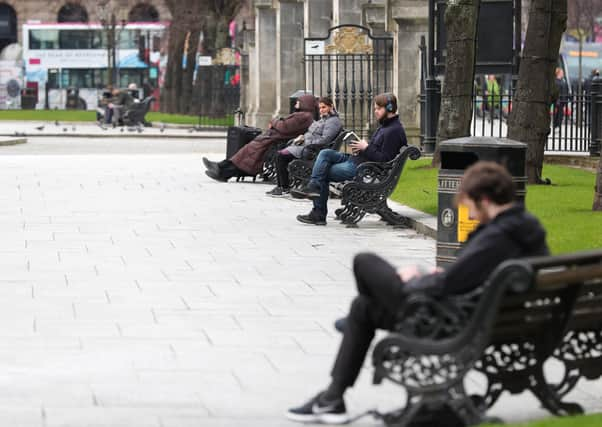Social distance fines in Northern Ireland drop from almost 400 to 30 in a month


Regulations announced by the Northern Ireland Assembly on March 28 state that no person may leave the place where they are living without reasonable excuse, in an attempt to stem the spread of coronavirus.
The Health Protection (Coronavirus Restrictions) Regulations NI 2020 also banned gatherings of more than two people.
Advertisement
Hide AdAdvertisement
Hide AdIt gave the Police Service of Northern Ireland (PSNI) powers to issue fines of up to £960 for those who repeatedly disregard officers’ requests to disperse.
On April 24, Assistant Chief Constable Alan Todd said police had issued 374 fines and 615 community resolution notices to date.
He said the approach of police was engaging with people, explaining the regulations and encouraging them to follow them, before turning to enforcement as a “last resort”.
The initially high number of fines reportedly led Mr Todd to instruct his officers to seek the approval of a senior colleague before issuing penalties.
Advertisement
Hide AdAdvertisement
Hide AdIn an email to officers, reported by The Impartial Reporter newspaper, he described the measure as a “short-term quality assurance and reporting measure”.
The number of fines issued by police dropped dramatically in May, according to PSNI figures released to the PA news agency.
Between May 1 and 26, 30 fines and 92 community resolution notices were issued by officers.
Ulster Unionist MLA Doug Beattie said the legislation had not as “as clear as it should have been” for police officers to enact.
Advertisement
Hide AdAdvertisement
Hide Ad“Police came under an awful lot of criticism at the start of the lockdown in regards to compliance, fines and the guidance they were giving to people,” he said.
“I think for many police officers this was a new field to them to have to police, it was something different, it was something new, and the law that politicians created around this probably wasn’t as clear as it should be.
“There was a backlash within society. I think that is one of the reasons why there is a slightly more relaxed view of that.
“I also think that as this has developed, police have become more comfortable with the legislation, with politicians slightly changing the legislation to make it more sensible, the situation has changed.”
Advertisement
Hide AdAdvertisement
Hide AdHe added: “I don’t think it is because there is more compliance, if I look at our streets, our roads, our shops, there are more people out there, less social distancing, a lot of people flouting that legislation.
“But it’s the devil they do, the devil they don’t for police. They were criticised when giving out fines, they would be criticised if they stopped.”
Meanwhile, data compiled by the Department for Infrastructure has indicated a steady increase in the number of road users since lockdown started at the end of March.
From a peak of being minus 74% on the baseline traffic flows (based on February/March 2018 and 2019 figures) on the weekend of April 11-12, levels have crept up.
Advertisement
Hide AdAdvertisement
Hide AdLast weekend, May 23-24, traffic levels were recorded as minus 46% of the baseline.
--
A message from the Editor:
Thank you for reading this story on our website. While I have your attention, I also have an important request to make of you.
With the coronavirus lockdown having a major impact on many of our advertisers - and consequently the revenue we receive - we are more reliant than ever on you taking out a digital subscription.
Subscribe to newsletter.co.uk and enjoy unlimited access to the best Northern Irish and UK news and information online and on our app. With a digital subscription, you can read more than five articles, see fewer ads, enjoy faster load times, and get access to exclusive newsletters and content. Visit https://www.newsletter.co.uk/subscriptions now to sign up.
Advertisement
Hide AdAdvertisement
Hide AdOur journalism costs money and we rely on advertising, print and digital revenues to help to support them. By supporting us, we are able to support you in providing trusted, fact-checked content for this website.
Thank you,
Alistair Bushe
Editor